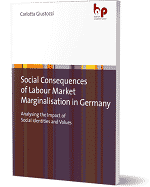 New with Budrich:
New with Budrich:
About the Book
The book examines the social consequences of labour market marginalisation for close social relations and social participation in Germany. Multilevel models and individual fixed effects analyses show that material security is an overrated factor. While financial strain does not explain the effects of labour market marginalisation on social exclusion, social identity and normative expectations are influential determinants.
Dear Carlotta Giustozzi, in your book you examine the social consequences of labour market marginalisation in Germany. Which questions do you exactly tackle?
I examine how difficulties at the labour market accumulate over time and how they affect an individual’s social integration and potentially lead to processes of exclusion. To that end, I analyse two dimensions of an individual’s social life: close personal relations and civic participation. The book analyses how the deviation from the full-time worker ideal affects different social groups and can make it more likely for them to withdraw from social interactions and civic engagement. Moreover, I explore the mechanisms that lead to such forms of social withdrawal by testing the impact of financial difficulties as well as identity struggles.
Could you say something more about your conceptual framework?
I distinguish between the private and the public aspect of an individual’s social integration. The distinction of close personal relations and civic participation differentiates between forms of integration with inherently different logics and functions. Close personal relations to family and friends imply emotional support, connectedness, and belonging. Instead, civic participation can function as a bridge into other social circles and contacts that can provide useful information, and can elicit belonging and integration beyond close family and friendship bonds into the wider community.
With respect to labour market marginalisation, I do not focus on single incidences or events, but analyse labour market marginalisation as a process, where individuals accumulate disadvantage over the life course. I chose this approach as it takes time for social relations and civic engagement to change. Therefore, a short episode of unemployment between jobs is probably not as influential as experiencing multiple incidences of unemployment. Such multiple and cumulative experiences are likely to affect an individual’s daily life as well as his or her social behaviour much more.
Moreover, I have three levels of analysis – the individual level, the household level, and the regional context. I think that this is important as individuals are embedded in different socio-economic contexts at the household as well as the regional level. I chose a regional context that is sensible with respect to commutable distances to capture local labour markets as well as socio-economically perceivable environments. The wealth or poverty of a local area can function as a reference for examining the own situation and at the same time set normative standards and impact social expectations.
How did you develop your topic? Is there a certain impetus associated with it?
The starting point of my analyses is the importance of employment as well as its function for structuring life courses and everyday interactions in our society. Many aspects of our lives depend on the type of work we do for a living: the place where we live, the people we meet, the certainty and uncertainty of our future, retirement, financial resources, and finally our social standing. From this perspective, I asked myself: What happens if someone experiences difficulties in such an important aspects of modern life? If work is important for not only economic security but also an individual’s identity – what happens to the social embeddedness of individuals if multiple or prolonged episodes of difficulties occur?
Were there any findings that surprised you or might surprise your readers?
The most prominent finding that runs through all analyses is the insignificance of financial difficulties for explaining the effects of labour market marginalisation on social relations and civic participation alike. It is remarkable that financial struggles are not responsible for mediating the relationship of labour market struggles and social integration. However, social identities play a significant role. How important employment is for someone’s identity influences whether individuals retrieve from social interactions or not. The social life of for example a father whose identity is tied to financially providing for his family will suffer from unemployment. This is less the case for women, as they tend to face less stigmatisation when turning to care responsibilities, as being a homemaker is an available and socially acceptable role. Alongside the gender differences, also the impact of values around work and family life point in this direction. Such normative orientations suggest that it depends on the importance of paid labour beyond the financial dimension whether someone is able to cope with difficulties. Experiencing unemployment for example does not affect the social life of people for whom having children and caring for others is very important as much as if family life is less important for someone.
Another interesting finding is that unemployment has negative effects on relationships to family and friends only for men, while it does not affect women’s close social networks. Moreover, while part-time work has a positive impact on engaging in civic activities for men and women alike, for men, working part-time has a tendency of eroding close social relations. This again points to deviations from the full-time worker ideal as an explanatory factor that is particularly valid for men.
This is why I have chosen Barbara Budrich as my publishing partner
I am very glad I have published my work with Budrich Academic Press. Overall, I received great support at all stages of the publication process: particularly with editing and formatting the manuscript but also with finding potential financial support. The friendly staff provided me with helpful information and extra material. Moreover, I was able to ask all kinds of questions regarding the publishing cooperation beforehand at an information workshop. Barbara Academic Press communicates openly, is helpful and available, and cares for the content and format of their publications.
Short vita (in author’s own words)
 Carlotta Giustozzi is a postdoctoral researcher at the chair of social stratification at the institute of sociology at Goethe University Frankfurt. She is currently working in an ERC funded project about the polarization of societies and its potential social and political consequences. Within the project, her focus lies on consequences of economic inequality for social cohesion. Before, she has worked on the erosion of political trust in the Great Recession analysing how welfare institutions and social policies shape this relationship across Europe and the US. Carlotta has obtained her M.A. in sociology and political sciences from Humboldt University Berlin and spent one year at the Graduate Centre of the City University of New York.
Carlotta Giustozzi is a postdoctoral researcher at the chair of social stratification at the institute of sociology at Goethe University Frankfurt. She is currently working in an ERC funded project about the polarization of societies and its potential social and political consequences. Within the project, her focus lies on consequences of economic inequality for social cohesion. Before, she has worked on the erosion of political trust in the Great Recession analysing how welfare institutions and social policies shape this relationship across Europe and the US. Carlotta has obtained her M.A. in sociology and political sciences from Humboldt University Berlin and spent one year at the Graduate Centre of the City University of New York.
Order via Budrich Webshop
© header image designed with canva.com

